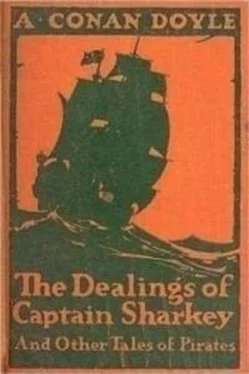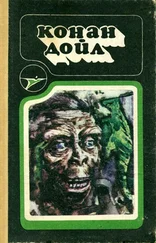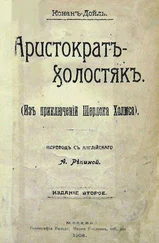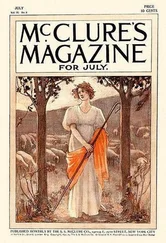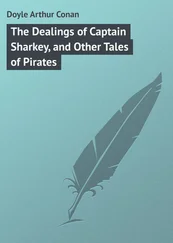"Good God!" I cried. "What can have done this?"
Severall had laid his hand upon the dead man's chest.
"Feel here," he whispered.
I placed my hand at the same spot. There was no resistance. The body was absolutely soft and limp. It was like pressing a sawdust doll.
"The breast–bone is gone," said Severall in the same awed whisper. "He's broken to bits. Thank God that he had the laudanum. You can see by his face that he died in his sleep."
"But who can have done this?"
"I've had about as much as I can stand," said the Doctor, wiping his forehead. "I don't know that I'm a greater coward than my neighbors, but this gets beyond me. If you're going out to the Gamecock ―"
"Come on!" said I, and off we started. If we did not run it was because each of us wished to keep up the last shadow of his self–respect before the other. It was dangerous in a light canoe on that swollen river, but we never paused to give the matter a thought. He bailing and I paddling we kept her above water, and gained the deck of the yacht. There, with two hundred yards of water between us and this cursed island we felt that we were our own men once more.
"We'll go back in an hour or so," said he. "But we need a little time to steady ourselves. I wouldn't have had the niggers see me as I was just now for a year's salary."
"I've told the steward to prepare breakfast. Then we shall go back," said I. "But in God's name, Doctor Severall, what do you make of it all?"
"It beats me—beats me clean. I've heard of Voodoo deviltry, and I've laughed at it with the others. But that poor old Walker, a decent, God–fearing, nineteenth–century, Primrose–League Englishman should go under like this without a whole bone in his body—it's given me a shake, I won't deny it. But look there, Meldrum, is that hand of yours mad or drunk, or what is it?"
Old Patterson, the oldest man of my crew, and as steady as the Pyramids, had been stationed in the bows with a boat–hook to fend off the drifting logs which came sweeping down with the current. Now he stood with crooked knees, glaring out in front of him, and one forefinger stabbing furiously at the air.
"Look at it!" he yelled. "Look at it!"
And at the same instant we saw it.
A huge black trunk was coming down the river, its broad glistening back just lapped by the water. And in front of it—about three feet in front—arching upwards like the figure–head of a ship, there hung a dreadful face, swaying slowly from side to side. It was flattened, malignant, as large as a small beer–barrel, of a faded fungoid colour, but the neck which supported it was mottled with a dull yellow and black As it flew past the Gamecock in the swirl of the waters I saw two immense coils roll up out of some great hollow in the tree, and the villainous head rose suddenly to the height of eight or ten feet, looking with dull, skin–covered eyes at the yacht. An instant later the tree had shot past us and was plunging with its horrible passenger towards the Atlantic.
"What was it?" I cried.
"It is our fiend of the cooperage," said Dr. Severall, and he had become in an instant the same bluff, self–confident man that he had been before. "Yes, that is the devil who has been haunting our island. It is the great python of the Gaboon."
I thought of the stories which I had heard all down the coast of the monstrous constrictors of the interior, of their periodical appetite, and of the murderous effects of their deadly squeeze. Then it all took shape in my mind. There had been a freshet the week before. It had brought down this huge hollow tree with its hideous occupant. Who knows from what far distant tropical forest it may have come! It had been stranded on the little east bay of the island. The cooperage had been the nearest house. Twice with the return of its appetite it had carried off the watchman. Last night it had doubtless come again, when Severall had thought he saw something move at the window, but our lights had driven it away. It had writhed onwards and had slain poor Walker in his sleep.
"Why did it not carry him off?" I asked.
"The thunder and lightning must have scared the brute away. There's your steward, Meldrum. The sooner we have breakfast and get back to the island the better, or some of those niggers might think that we had been frightened."
"Well," said our Anglo–Jap as we all drew up our chairs round the smoking–room fire, "it's an old tale out yonder, and may have spilt over into print for all I know. I don't want to turn this club–room into a chestnut stall, but it is a long way to the Yellow Sea, and it is just as likely that none of you have ever heard of the yawl Matilda , and of what happened to Henry Jelland and Willy McEvoy aboard of her.
"The middle of the sixties was a stirring time out in Japan. That was just after the Simonosaki bombardment, and before the Daimio affair. There was a Tory party and there was a Liberal party among the natives, and the question that they were wrangling over was whether the throats of the foreigners should be cut or not. I tell you all, politics have been tame to me since then. If you lived in a treaty port, you were bound to wake up and take an interest in them. And to make it better, the outsider had no way of knowing how the game was going. If the opposition won it would not be a newspaper paragraph that would tell him of it, but a good old Tory in a suit of chain mail, with a sword in each hand, would drop in and let him know all about it in a single upper cut.
"Of course it makes men reckless when they are living on the edge of a volcano like that. Just at first they are very jumpy, and then there comes a time when they learn to enjoy life while they have it. I tell you there's nothing makes life so beautiful as when the shadow of death begins to fall across it. Time is too precious to be dawdled away then, and a man lives every minute of it. That was the way with us in Yokohama. There were many European places of business which had to go on running, and the men who worked them made the place lively for seven nights in the week.
"One of the heads of the European colony was Randolph Moore, the big export merchant. His offices were in Yokohama, but he spent a good deal of his time at his house up in Jeddo, which had only just been opened to the trade. In his absence he used to leave his affairs in the hands of his head clerk, Jelland, whom he knew to be a man of great energy and resolution. But energy and resolution are two–edged things, you know, and when they are used against you you don't appreciate them so much.
"It was gambling that set Jelland wrong. He was a little dark–eyed fellow with black curly hair—more than three–quarters Celt, I should imagine. Every night in the week you would see him in the same place, on the left–hand side of the croupier at Matheson's rouge et noir table. For a long time he won, and lived in better style than his employer. And then came a turn of luck, and he began to lose so that at the end of a single week his partner and he were stone broke, without a dollar to their names.
"This partner was a clerk in the employ of the same firm—a tall, straw–haired young Englishman called McEvoy. He was a good boy enough at the start, but he was clay in the hands of Jelland, who fashioned him into a kind of weak model of himself. They were for ever on the prowl together, but it was Jelland who led and McEvoy who followed. Lynch and I and one or two others tried to show the youngster that he could come to no good along that line, and when we were talking to him we could win him round easily enough, but five minutes of Jelland would swing him back again. It may have been animal magnetism or what you like, but the little man could pull the big one along like a sixty–foot tug in front of a full–rigged ship. Even when they had lost all their money they would still take their places at the table and look on with shining eyes when any one else was raking in the stamps.
Читать дальше
